The term “narcissist” has become synonymous with evil. But being with a narcissistic person can help you expand your spiritual self and learn valuable lessons in life leading to a better and stronger version of yourself.
Is A Narcissistic Person Pure Evil?
Narcissists are EVIL!!! That’s what we’ve been told. If you have encountered a narcissist in your life, whether a parent, a partner, or a coworker, then you have a pretty good idea about how evil-intentioned and dangerous they can be. What we need to realize is that narcissism is a personality disorder that requires medical treatment and support.
Author Melissa Schenker writes “It’s a current national pastime to bash narcissists. They are easy targets. Despite their intense need for approval, those in the public eye can’t help but mostly be seen in a negative light.”
If you have lived with a narcissist, you know how they abuse and torment their victims to boost their feeble egos and self-esteem. Being in a relationship with a toxic narcissist can feel like going through hell. Cognitive scientist Art Markman, Ph.D. explains “Narcissists are people who maintain their self-esteem by drawing on the energy of other people.”

But we must understand that a narcissistic person is suffering from a diagnosable mental condition known as a narcissistic personality disorder. Although that doesn’t give them the permission to abuse you, it should help you understand why a narcissist behaves the way they do. It should help you understand that they may not be as evil as they are typically portrayed.
But don’t get me wrong. This is not about promoting narcissism or abuse. The point is, there is some silver lining even when it comes to narcissists. The truth is with understanding comes awareness. “We may love to hate narcissists, but the fact is that we need to do better. We need to understand narcissists. Because we need to take care of ourselves,” adds Melissa Schenker.
Related: Are Narcissists Evil? Or Are They Just Helpless?
Not Tormentor, But A Mentor
Although it may be very difficult to grasp, there is a reason why that narcissistic person is in your life. They are here to guide you, to teach you some hard lessons that you wouldn’t have learned otherwise. They are here to push you to the extreme and empower you to explore a side of your inner self that you never even knew existed. They’re here to help you become a stronger, and better version of yourself.
We tend to attract what we need the most. And what we need the most is inner healing. We need to grow spiritually as human beings; explore what we are truly capable of; to know how we can help ourselves and others. Narcissists can help a lot when it comes to helping you become a better version of yourself, albeit unintentionally. They can help you become a more compassionate, mindful, resilient, and a happier person.
So instead of being a victim of a narcissist, choose to be a student. Shift your mindset and see them as a life coach, a teacher, or a mentor instead of an abuser. When you see yourself as a student, your awareness will start to expand. Melissa Schenker adds “You’ll come to understand that a narcissist has a way of being that is different from yours, and you’ll find ways to interact or create a distance that works for you, rather than exhaust you or put you at risk. At some point, you’ll find that you’re done with that class.”
Spiritual Lessons From A Narcissistic Person
Is this a joke? Not at all. You must be still wondering how exactly a narcissistic person can help you in your spiritual development. A NARCISSIST? Yes, a narcissist. Once you see yourself as a student, you will learn the following spiritual lessons from the toxic, abusive narcissist in your life:
#1: What you can learn: Your self-importance
Another crucial lesson that you can learn for your spiritual growth from a narcissist is the lesson of humility or the trait of being humble. Humility helps us gain freedom from ego, arrogance, and pride. Being with a narcissistic person can teach you humility and make you see how ego can limit you and pull you down.
Author Anna Katharina Schaffner, Ph.D. says humility means “admitting our own shortcomings and seeking to overcome them. It is about readiness to learn best practices from others. Humility involves teachability, a mindset that embraces constant self-correction and self-improvement.”
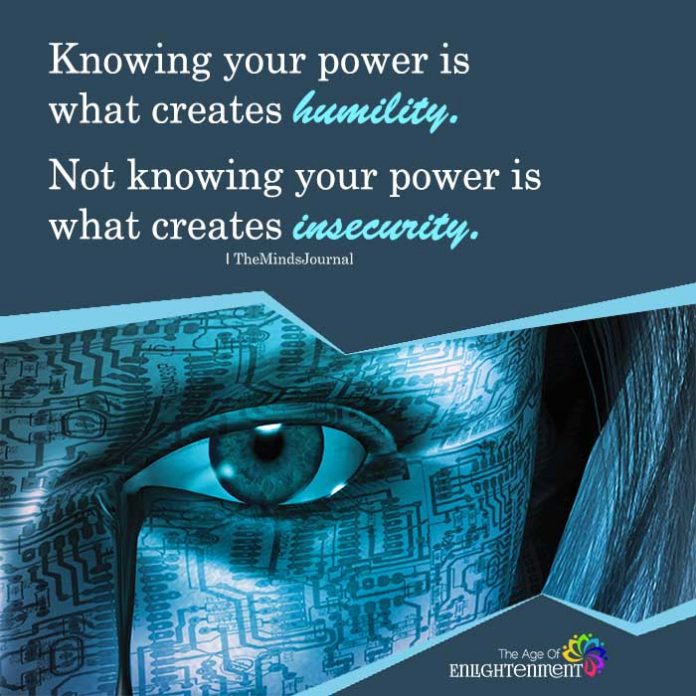
Narcissists believe that they are the center of the universe. And they can help you realize how wrong they are. Your “tor-mentor” can help you learn that you don’t need to rescue or save or fix anyone. You are not responsible for anyone, except yourself. You don’t need to fall victim to their projections, manipulations, guilt trips, and burdens. Knowing your value will help you overcome enmeshment and stop feeling over-concerned for others.
Licensed psychologist Robert Enright, Ph.D. writes “Humility is not humiliation or being put down and shamed by others. Humility is seeing the truth about oneself so that pride or narcissism does not dominate.” The words, actions, and behaviors of a narcissistic person are a reflection of themselves, not you. It is their lack of humility and a strong desire for external validation that keeps them from healing their inner pain and finding happiness.
By being a student of a narcissist, you can learn to be humble and avoid the traps they have set only for themselves.
Related: Practice Humility: 3 Tips For Taming Your Ego
#2. What you can learn: The value of boundaries
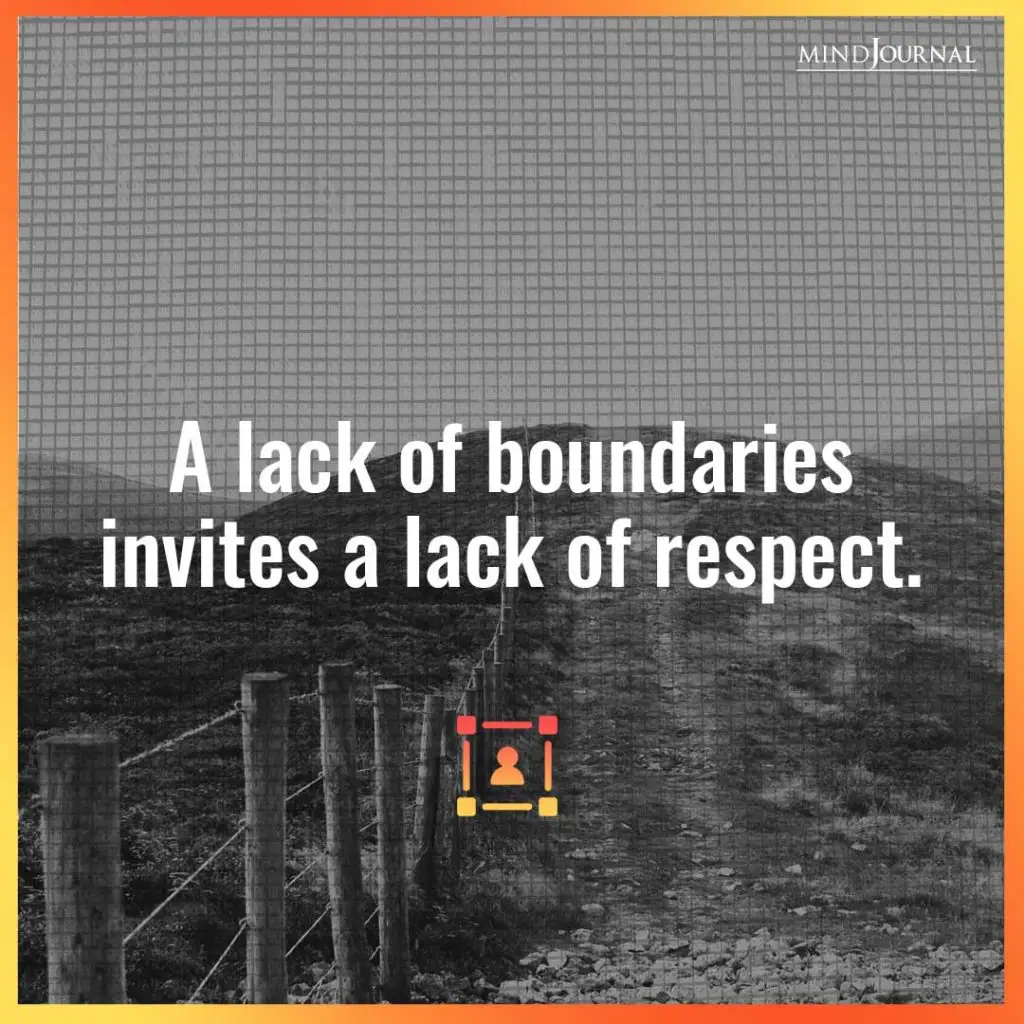
Let’s face it, most of us have poor personal boundaries. This is one of the main reasons why a narcissistic person finds it so easy to dominate our lives. Whether we want to please or accommodate others or tend to feel shy or emotionally sensitive, we fail to establish clear boundaries to protect our mental, emotional, and physical well-being.
And that serves as an open invitation to our teacher – the narcissist. They simply do not care about your weak boundaries and walk all over them. Clinical psychologist and author Karen Nimmo explains “Narcissists don’t ‘get’ boundaries. They don’t respect your need for personal time and space because their primary driver is for you to validate THEM. They don’t want you to enjoy time with other people who matter to you.”
Everyone needs healthy personal boundaries, in life and in relationships. However, it is YOU who has to set those boundaries and let people know about them. You can’t assume that people, especially a narcissist, will guess your boundaries and respect them. You have to teach them to respect your personal boundaries. And that is one of the most important lessons a narcissistic person will teach you in life.
As a student, you will learn to stand up, speak up and take control of your life by establishing healthy boundaries.
Related: Healthy Boundaries: How To Protect Your Personal Space
#3. What you can learn: Unconditional forgiveness
Forgiving someone who wronged you, especially an abusive narcissist, may often seem like a sign of weakness. But forgiving the person who abused you for months or years and doesn’t even realize their mistake takes a lot more strength and courage than you may realize. “Forgiveness is good for your heart,” says wellness coach Elizabeth Scott, MS.
When you’ve been abused, letting go of all the pain, suffering, betrayal and hatred can seem impossible. But the truth is we will never gain anything by holding to these difficult emotions. Your narcissist will NEVER apologize for hurting you. They won’t even admit they were wrong. They will act as if they don’t need your forgiveness.
But you don’t forgive them because they deserve it. No. You forgive them for yourself. Unconditional forgiveness will liberate you from all the negative emotions and help you reach the next level in your spiritual growth.

A 2017 study has found that “greater forgiveness is associated with less stress and, in turn, better mental health.” The more you hold on to your suffering, victimhood, and grudges, the more you will find yourself entangled in negativity. Forgiveness will allow you to let go and move on to build a better, happier version of yourself.
Related: Understanding The 4 Stages Of Forgiveness
#4. What you can learn: Expansion of self-awareness
Awareness is the core of spiritual development. By closely observing your narcissistic mentor, you will realize that most of their negative aspects represent something you need to “fix” within yourself. The narcissistic person may reflect certain childhood traumas or drawbacks that you may need to address and heal.
The unhealthy attachment style and toxic relationship that you share with your narcissist is a reflection of the same toxic attachment style you share with someone else in your life, which in most cases are your parents. Our narcissistic partners are often an extension of our toxic parents as we portray the same needy behavior around them, desperately seeking validation, love, and approval from someone who is reluctant to give it.
Being with a narcissist can help you become aware of such tendencies and help you cope with your innermost feelings of being unworthy, insecure, and unloved. Consultant Tchiki Davis, Ph.D. writes “Self-awareness involves monitoring our stress, thoughts, emotions, and beliefs. It is important because it’s a major mechanism influencing personal development.”
#5. What you can learn: The strength of compassion
As I said earlier, narcissism is a personality disorder that requires treatment, guidance, and support. A narcissistic person is not necessarily a manifestation of evil. They are still human beings, even though they may be highly selfish, insensitive, abusive, and deeply flawed.
But then again none of us are perfect. We are all coping with our imperfections trying to get through another day, desperately hoping no one notices our flaws. Narcissists have mental health issues and are constantly struggling with intense insecurities, loneliness, fear, anxiety, and weak self-esteem. They are desperate to seek love, admiration, validation, and appreciation and this desperation force them to make some serious mistakes.
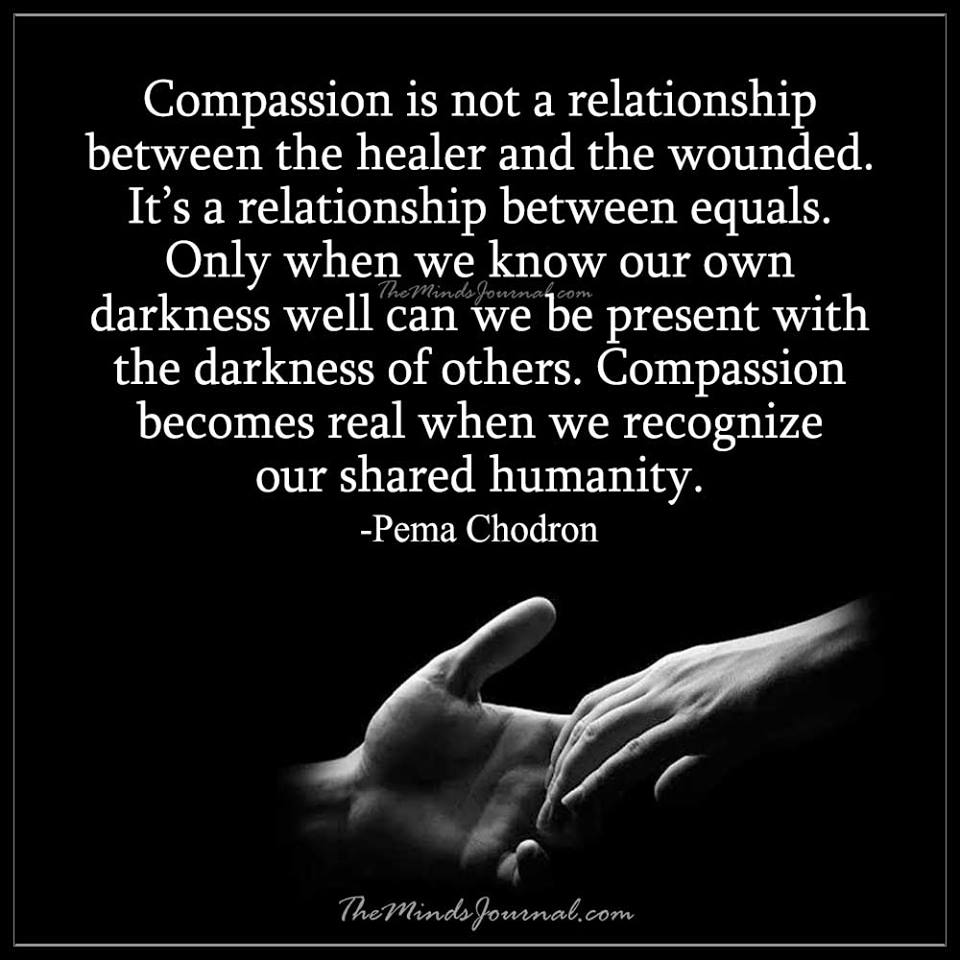
By making you aware and realize this, narcissism teaches you compassion. Author & research scientist Emma Seppälä Ph.D. explains “compassion is defined as the emotional response when perceiving suffering and involves an authentic desire to help.”
Compassion is closely related to empathy and altruism which enables us to enrich our souls by helping others. Having compassion for a narcissist means helping them seek the right treatment, building healthy relationships, and seeking internal validation instead of external approval. Altruism and compassion can clear all blockages in your spiritual growth.
However, compassion often begins with yourself. It starts by realizing that you are not responsible for anyone’s behavior and accepting yourself, despite your flaws and failures.
Positive psychology Coach and author Taylor Kreiss, MAPP explains “studies show that people who score higher in self-compassion tend to experience less depression, increased motivation, more optimism, greater happiness, and higher life satisfaction.” Self-compassion also means not allowing anyone to abuse or bully you simply because you’re trying to help them.
Related: 5 Ways You Can Practice Self-Compassion And Be Kind To Yourself
#6. What you can learn: To love yourself
Loving yourself means standing up for yourself. It means having strong boundaries, knowing your self-worth, having compassion for others, and the strength to forgive an abuser. It also means that simply because you are willing to help and forgive someone, it doesn’t mean that you allow them to exploit you.
Self-love is not about being selfish. It is about giving yourself the love you deserve. It is about valuing and respecting yourself.
Self-love is crucial for your psychological, emotional, and spiritual development. Self-love expands through hardships, struggles, and actions which empower us to mature emotionally. And being with a narcissistic person will undoubtedly teach you how to love yourself. You will start accepting yourself despite all your weaknesses, you will find your life purpose and experience fulfillment and satisfaction with your own efforts.

Clinical psychologist Deborah Khoshaba Psy.D. writes “Self-love is important to living well. It influences who you pick for a mate, the image you project at work, and how you cope with the problems in your life.” Self-love also helps you gain the awareness to realize when it’s time to let go of someone and provides you the strength to walk away.
Related: 9 Steps That’ll Help You Love Yourself Better
There’s Light In The Darkness
Narcissism provides you the darkness to help you realize the value of even the faintest bit of light. In essence, a narcissistic person can help you be more grateful for life. They can help you heal your inner child and discover who you are truly meant to be.
They are a difficult, yet important part of your spiritual journey. They can help you learn the deepest spiritual lessons of your life and find your true self. Accepting this purpose of the narcissist can liberate you from all the pain, fear, and confusion. Without a narcissist, you may not have been able to become your most authentic self and build a life that aligns with your spiritual journey.


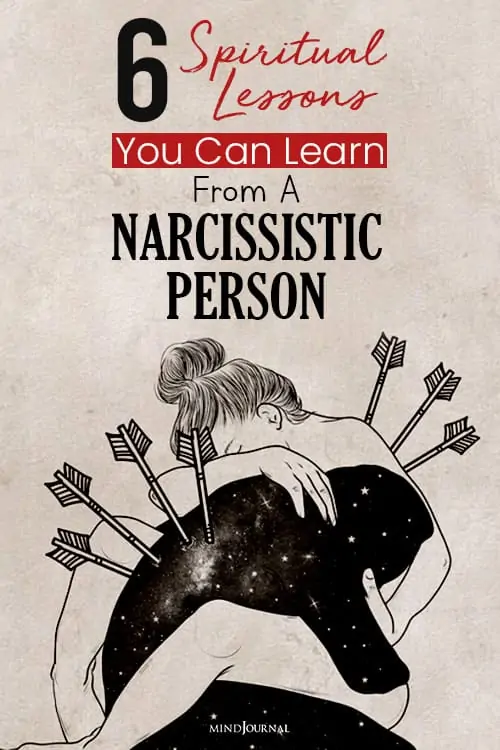
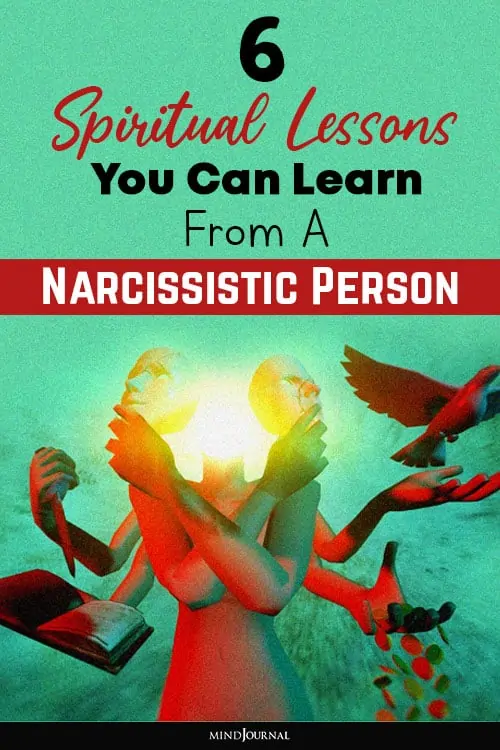
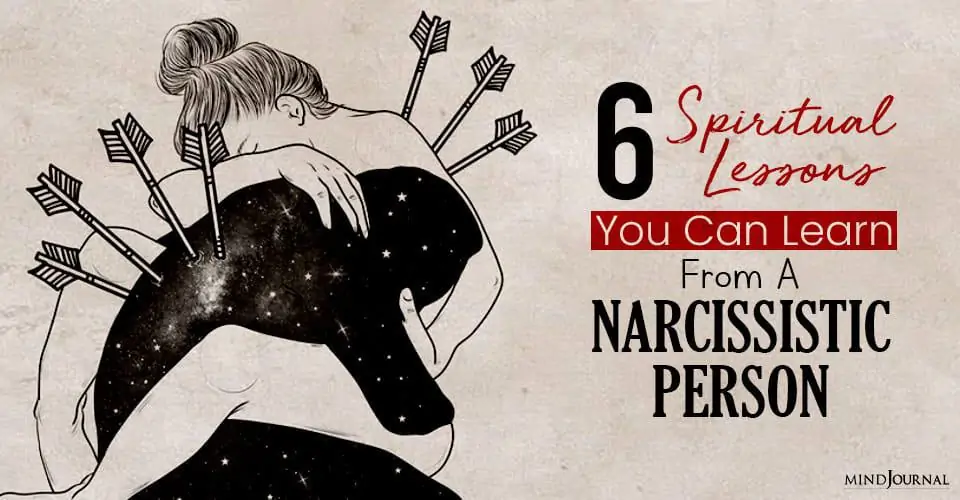







Leave a Reply
You must be logged in to post a comment.